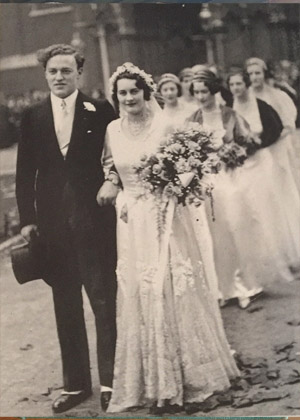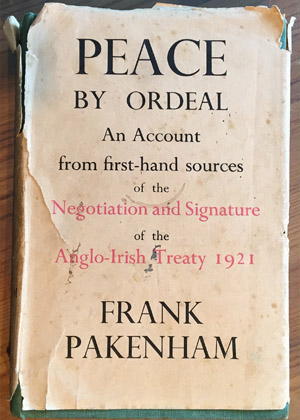REDEEMING DEV, DAMNING GRIFFITH: PAKENHAM’S PEACE BY ORDEAL
Published in Issue 4 (July/August 2022), Platform, Volume 30By Colum Kenny
Born in England in 1905, when Arthur Griffith first articulated his Sinn Féin policy, Frank Pakenham became the 7th Lord Longford in 1961. He grew up between his Anglo-Irish family’s mansion in Oxfordshire, their house in London and a castle in County Westmeath.
If one book has shaped most profoundly the reputation of Arthur Griffith since his death in August 1922 it is Pakenham’s Peace by ordeal (London, 1935). It enmeshes within persuasive prose a theory that Griffith was somehow duped into giving prior and even ‘secret’ prejudicial assent to the Treaty deal in London in December 1921.
There are strong grounds for treating Pakenham’s book with great caution, yet his weakly referenced work has been praised as ‘definitive’, and his version of events is integrated into the fabric of later accounts—without their source being identified in some cases. Such secondary accounts are themselves cited in turn.
Pakenham (1905–2001) wrote Peace by ordeal deliberately to redress British antipathy to de Valera: ‘I had heard of him before I met him as “a Portuguese Jew” or worse’, he wrote later. Nicholas Mansergh has described Pakenham as ‘sympathetic to de Valera’s position’.
In 1932 de Valera became President of the Executive Council of the new state (‘Taoiseach’ today). A decade earlier he had reportedly warned of wading through Irish blood and ‘perhaps through that of some of the members of the Irish Government’ to overthrow the Treaty. In 1935 the pro-Dev Irish Press recommended Peace by ordeal because it ‘justifies for all time those who refused to compromise on a question of vital national principle’ and its importance ‘is impossible to exaggerate’. The Irish Independent serialised it, reflecting its widespread impact.
Pakenham underpins an anti-Treaty narrative of avoidable failure in London. Instead of applauding Griffith and his team for achieving as much or more than might realistically have been expected, he ultimately damns them for purportedly being seduced by Tory cunning.
Griffith is said by him to have secretly approved a key document in November 1921. Lloyd George dramatically flourished this on the last night of talks in December. Yet Pakenham avoided a question from Brian Maye who, writing his biography of Griffith in the 1990s, enquired where one might find that document. There is no evidence that Griffith signed or approved it, and there is evidence to the contrary.
Pakenham’s objective was not purely to write history. Indeed, he had dropped History after his first term at Oxford and switched to Modern Philosophy, Politics and Economics. Schooled at Eton, Pakenham at Oxford University was a member of the élite Bullingdon Club. He was a close friend of Freddie, son of F.E., Smith (Lord Birkenhead), who had actively supported Carson at Ulster loyalist rallies. Birkenhead, as England’s lord chancellor, was one of the two top Treaty negotiators for the Tories. His wife Margaret and Pakenham’s mother had also been ‘close friends in childhood’.
Birkenhead welcomed Pakenham into his home, Charlton. Pakenham wrote that between 1928 and 1932 ‘much of my social life centred upon the Birkenhead family’. He described himself as ‘a fully-fledged member of the Charlton circle’ and came under what he called ‘the magic of Lord Birkenhead’s personality’. They played golf and tennis and went riding together—and Birkenhead encouraged his speech-making. Pakenham added, ‘Freddy and his family soon came to occupy a place apart in my eyes’. Freddy was a godson of Birkenhead’s closest friend, Winston Churchill, also on the British Treaty team.
In 1929 Pakenham took a job in the Conservative Research Department, chaired by Neville Chamberlain, a future prime minister—and half-brother of Austen. Pakenham’s maternal grandmother was Neville’s and Austen’s first cousin. In 1931 two Chamberlain girls were bridesmaids at Pakenham’s wedding, and Birkenhead’s son his best man.
It is said that Austen Chamberlain offered to show Pakenham official English documents on the Treaty, but instead changed his mind and only spoke to Pakenham, who favoured his version of events over Griffith’s. Chamberlain, as Tory leader, had been that party’s other top negotiator on the Treaty.
Did Pakenham know in 1924, as the Churchill Archives reveal, that Birkenhead admitted to Chamberlain that Griffith and Collins arguably had a basis for their belief that the Boundary Commission would assign significant portions of Northern Ireland to the Irish Free State?
While ‘working officially for the Conservative Party’, in its research department, Pakenham suggested an investigation of ‘the Irish Question’. He then made contact with de Valera for the first time and, writes his biographer Mary Craig, ‘Frank fell instant victim to Dev’s charm’. He converted to the Labour Party and Catholicism later.
It was ‘through a happy accident, and the crucial intervention of my friend Eleanor Smith [Birkenhead’s daughter]’, noted Frank, that ‘I was invited to write a book on the Anglo-Irish Treaty’. His wife attributed to Lady Eleanor—a popular novelist—not just the securing of a publisher but also ‘the actual idea of the book’.
Pakenham’s chief sources were Eamon de Valera, Robert Barton and Austen Chamberlain. Lloyd George brushed off an attempted interview, although Pakenham claimed in 1994 that Thomas Jones, the former prime minister’s cabinet secretary, ‘talked to me generously’. By 1994, however, Jones’s diary of 1921 had been published and supported aspects of Griffith’s version of events that Pakenham had rejected.
Pakenham benefited from access to official Irish documents shared with him (selectively?) by de Valera and Barton. Decades later, while co-authoring with T.P. O’Neill a favourable biography of de Valera, published in 1970, he expressed regret that de Valera was not the leader of a great power ‘where his abilities would have had more scope’ (Irish Times, 15 August 1968). De Valera, then Ireland’s president, was again cooperating closely with Pakenham.
Although Barton had signed and voted for the Treaty agreement, he later supported de Valera. In 1933—while Pakenham wrote Peace by ordeal—de Valera’s Fianna Fáil government made Barton chairman of the Agricultural Credit Corporation.
While conceiving Peace by ordeal, Frank and his wife spent weekends at Barton’s Anglo-Irish family home—Glendalough House, Co. Wicklow—where Barton’s cousin Erskine Childers (a bitter critic of Griffith during the Treaty talks) had also grown up. The Pakenhams were shown where Erskine was arrested there during the Civil War before his execution by the Provisional Government. Barton had given Erskine’s widow Molly a home there, and when the Pakenhams were guests the anti-imperialist Molly and her mother were sometimes present. ‘I must have heard the story of his death twenty times if I heard it once’, wrote Pakenham’s wife.
In 1954 Barton told the Bureau of Military History that ‘the most terrific things’ were said privately by Griffith and Collins to get him to sign the agreement in London. The diary of Erskine Childers, however, reveals that on 6 December 1921 Barton told him that ‘my allusion to Molly’s support for refusal to sign last night made him [Barton] sign—deciding element—because her name reminded him of thousands of homes to be ransacked’. In the 1930s Glendalough was a febrile haunt for the young Oxford graduate honing his Treaty theory.

Above: Frank Pakenham and Elizabeth Harman wed at St Margaret’s (‘the Parliamentary Church’), Westminster, in November 1931. His Peace by ordeal appeared four years later. (Alamy)
Pakenham also consulted Moya Llewelyn Davies, a friend to Michael Collins in London. Six years after Pakenham’s book appeared she told P.S. O’Hegarty that ‘De Valera and Bob Barton superintended every line he wrote. I saw their pencilled comments down every margin of the typescript’ (National Library MS 41,780). She added that, when she saw this, she ceased cooperating with Pakenham.
As late as 1994 Pakenham was claiming that the Treaty team ‘signed without reference back to Dublin’. Yet, as letters now published show, it continually referred back to de Valera. There was also a chaotic cabinet meeting in Dublin two days before the final night of talks. Barton himself pleaded with Dev to come to London. The agreement signed in London was also strictly conditional on approval in Dublin, by a majority of members of parliament there.
As an exercise in devil’s advocacy, Peace by ordeal presented de Valera to British readers in an unaccustomed manner and challenged hostile opinions of him. Nevertheless, with both Griffith and Collins dead and unable to defend themselves, Pakenham’s evident and sustained admiration for a man as canny, long-lived and given to policing his own reputation as de Valera should alert Irish historians to bias or error.
Colum Kenny is the author of The enigma of Arthur Griffith: ‘father of us all’ (Irish Academic Press, 2020).

















